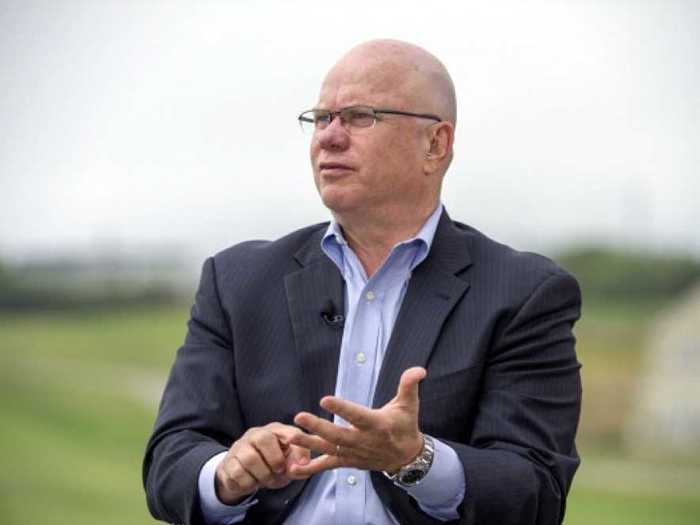8 super-successful people share their best advice on how to quit a job
Richard Branson says you should use the opportunity to build bridges, not burn them.

Suze Orman says to trust your instincts.

"Listen when your gut tells you to move on," writes Suze Orman.
It was the personal finance guru's own gut feeling that prompted her to end her show with CNBC after 13 years and 638 episodes.
"About a year ago, something started to change. I woke up one morning, and I knew that it was time to end the Suze Orman Show," she explains of her decision. "My heart knew it was time for me to go."
This decision also put her in the driver's seat: "Lets face it: If you stay on for the wrong reasons, your eventual exit will likely not be on your own terms. By taking the initiative to recognize I needed to move on, I have had the great experience of leaving without regret or acrimony."
Read her full post here.
Robert Herjavec says it's important to remember that quitting doesn't mean you're failing.

"The way I see it, quitting isn't losing," writes the "Shark Tank" investor. "It's simply changing direction."
Herjavec likes to use the term "pivoting," rather than "quitting," because people automatically equate quitting with failure.
"Call it what you will but quitting a strategy, or a job, should not be seen as failure. We can't win at everything we do," he says.
The trick is finding what you're good at, and this opportunity often arises from quitting, which is why Herjavec calls it "a blessing in disguise — an opportunity to pivot to something greater."
Read his full post here.
J.T. O'Donnell says you should never accept a counter-offer, no matter how tempting it may be.

There may be a time in your life when you go to resign, and your boss says, "Please stay!" She may even promise you incredible opportunities and better perks, including more money.
"Here's what I know," writes J.T. O'Donnell, CEO of CAREEREALISM. "You shouldn't stay. You need to go."
Why? If you accept a counter-offer and stay, chances are your company no longer trusts you; they'll resent you for making them beg; your renewed enthusiasm will quickly fade; and eventually you'll leave, and that will cause two bridges to be burned (the company you led on and then turned down, and this employer).
"When you make the decision to quit, don't waver. Show good character by following through on your decisions and proving you aren't just about the money."
To turn down the counter-offer, O'Donnell suggest you try something like:
"I am honored and grateful that you think enough of me to do that. However, I must go and try something new. I may hate it. In which case, I promise to contact you, admit I made a terrible mistake, and ask what I can do to earn a job here again. And, if I love it, I'd like to still stay in contact with you. Because hopefully, I'll learn some things that might make me an even better fit for future opportunities here. I'd like to come back someday and bring even more value to the company."
Read her full post here.
Maynard Webb says you should never let anyone make you feel disloyal.

Yahoo chairman Maynard Webb has only been fired once in his career. He was 13 and cleaning toilets at Mr. Donut. The experience stuck with him and taught him the art of leaving gracefully (and on his own terms).
A few of his tips include:
1. Don't only think about the future — also stay focused on the present. "Work to ensure a smooth transition," he writes. "Give everyone adequate time to prepare for your departure. Often times two weeks is not enough notice. Senior roles require three to four weeks."
2. Always act gracious and professional. "People have long memories. Reference checks never go the way you expect."
3. Don't let anyone make you feel disloyal. "If your company is Neanderthal in its thinking, managing by fear, and trying to make you feel guilty for leaving, you shouldn't be there anyway," Webb says. "Do a great job while you finish out your time and feel good about moving on!"
Read his full post here.
Adena Friedman says to remember it's a small world — and there's a good chance you'll work with these people again.

"When you leave an organization, do your best to leave on good terms," advises Adena Friedman, president of global corporate and information technology solutions at Nasdaq. "As I see it, the world is a small place; you never know when you might work with or for some of the same people again, nor do you know if you'll become a client of that company or if the company will become your client."
As it turns out, Friedman left Nasdaq in 2011 for an incredible opportunity, but eventually returned to what she calls her "home."
She learned that returning is possible, but only if "everyone understands why you are leaving, you maintain good relationships with the company you're leaving, you demonstrate genuine care for the company and its culture, and you look for ways to partner with your former employer."
She likes to refer to the age-old saying, "don't burn your bridges behind you."
Read her full post here.
James Altucher says to leave when enough is enough.

"Well, I didn't quit," writes entrepreneur James Altucher. "It was worse than that."
Altucher was in the middle of an exceptionally boring meeting when he excused himself for the bathroom. "I limped out. I said goodbye to the receptionist. I didn't take my coat, my bag, or any of books. My name might still be on my door. I took the elevator 49 floors down. I went up to Grand Central, took the train 70 miles north. I never went back to work."
Although unconventional and not the most graceful of ways to leave, sometimes enough is enough, or as Altucher puts it: "Sometimes all the BS adds up until you can't move anymore, until you can't get out of bed."
Altucher admits that his exit was not the most ethical, but he does not regret leaving an unfulfilling and unsatisfying job. The most important thing is to "find real meaning in your life instead of a means to some financial goal or pleasure."
Read his full post here.
Robert Nardelli says you should never forget the people you're leaving behind.

Leaving General Electric was a grappling decision for Robert Nardelli, the former CEO of GE Transportation and GE Power Systems. He made sure to be thorough and thoughtful during the quitting process, and followed these three guidelines:
1. Don't run away. "Don't make a decision you might later regret, simply because you are frustrated or disgruntled," he writes.
2. Your new job should be better than the one you leave. "If you have the luxury of working for a major corporation with a great brand and a proven track record of developing great leaders, don't be too quick to leave for a title elsewhere," he says.
3. Know exactly what you're looking for. "Do you want to be in a different industry entirely? Do you have a geographic preference? Do you want a broader role of P&L versus functional responsibility?" Nardelli advises you to "honestly and candidly compare what you have in hand – and your potential at your current company — with what you might achieve in the new position."
Once you've thought it through and decide to leave, "do it the right way, and never forget the people you leave behind," he writes. "You never know when you'll see them again!"
Read his full post here.
Now check out their best career advice of all time:

Popular Right Now
Popular Keywords
Advertisement